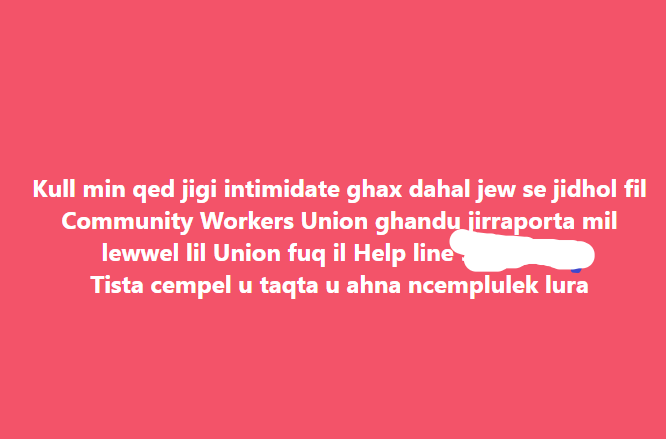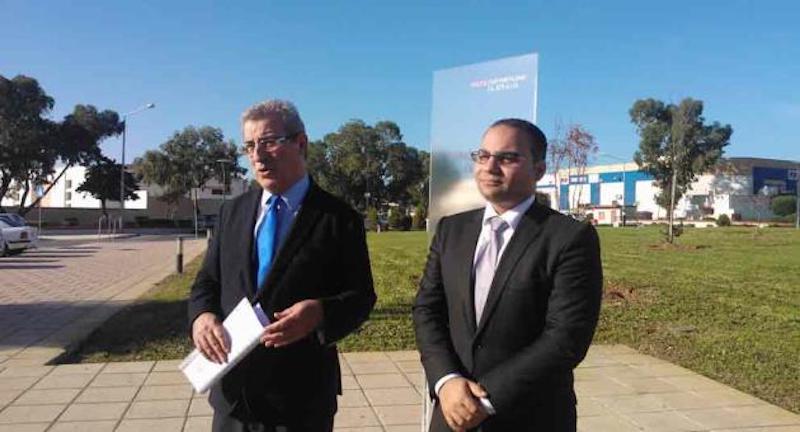Unemployed people who have been ‘temporarily’ placed on the government’s Community Worker Scheme – aimed at training people for a short time until they find gainful employment in the private sector – have formed their own union aimed at forcing the government’s hand to guarantee them a permanent government job and to pay them a salary in line with that of other public service employees.
Established a few months ago, the Community Workers Union has been recruiting members from among the scheme’s 1,200 workers to “fight for the rights of its members”.
Workers placed on the ‘training scheme’ are paid minimum wage instead of unemployment benefits. In return, they are tasked with odd jobs for government departments and local councils on a supposed 40-hour-a-week basis with little or no supervision.
Ironically, their employer is a foundation owned by the General Workers Union, which has been given a multimillion euro tender from the government to manage the scheme. The GWU, whose main historical mission was to defend workers’ rights, makes a profit from each and every worker placed on this scheme by the government.
Workers speaking to The Shift on condition of anonymity said the GWU had put various spokes in the wheels to discourage them from joining the new union. Workers spoke of intimidation, fearing that if they joined the union, “there will be more surveillance on those in the union while at the place of work.”

The CWS members also complained that despite promises from various ministers, particularly before the general elections, that their temporary job would become permanent, they are now being told that they would be unable to join the public service through the scheme.
They are also claiming discrimination because while doing the same jobs as other civil servants in various government entities and departments, they are being paid only the minimum wage while their counterparts in the public sector recruited through regular channels take home double their salary.
“Where is the principle of equal pay for equal work that the GWU is supposed to be defending?” one frustrated CWS member asked.
Government sources told The Shift that while it was true that these workers are being paid low wages, it was also true that this is a training scheme and not a job agency.
“The reality is that these people are being given a job for training purposes and not some kind of fixed job. The fact that they are spending years in the scheme means that the scheme is not working and that the government is using these people just to give them something to do instead of seeing them register as unemployed and claim benefits.”
The scheme was first set up in 2009 and was reinvented in 2016 by now Finance Minister Clyde Caruana when he was chairing JobsPlus. Its scope was to offer temporary assignments to the long-term unemployed for a restricted amount of time and until they could find other means of gainful employment.
Caruana had originally said the scheme was to be capped at 580 long-term unemployed people and that no more workers would be taken on board. The idea was for the scheme to be wound down once all its participants had found alternative gainful employment in the private sector.
Caruana’s plans, however, completely misfired, and the scheme started being used by his ministerial colleagues as some kind of new government employment agency, through which voters would be given an easy government ‘job’ in exchange for their support at the ballot boxes.
Instead of winding down, the scheme ballooned to some 1,200 people by the last elections, with ministers placing people on its books without any explanation.
Half of the scheme’s members hail from Gozo, where the scheme proved extremely popular with those claiming to not have a job.
The cost to the state coffers has now reached some €20 million a year.
The GWU foundation that manages the scheme on the government’s behalf makes hundreds of thousands of euros in profits from the scheme every year – directly from taxpayers’ funds.
The scheme provides the government with an advantage – since the 1,200-odd workers are employed by the GWU’s foundation and not directly by the government, they are classified as working for the private sector, although their salaries are being paid by the public.













How the GWU became a slave subcontractor while becoming rich with every work permit stamped for every third world worker by the present Minister Caruana . Blood Diamonds it is called.
The government says this is a training program.
What kind of training/qualification is it exactly?
What a farce this Minister Caruana has become, where he was first targeting to save some 200 Million from government spending. For what? By all means he wants this leverage to give it to the Air Malta employees or the GWU to continue making profit on these poor fellows of workers, when they are supposed to combat precarious work. Total disaster. Kulhadd jahtaf kemm jiflaħ bla biża u mistħijja ta xejn.
A veritable Kafkaesque situation, if ever there was one, in the workers’ union world.
From a workers union the GWU has turned into a Maltese oligarch participating in corrupt projects with the government.
Mela intom il haddiema tal Airmalta?
Deals equal pay u job guarantee lill haddiema tal Airmalta ser jnghataw.
Ftakru li minn fuqkom u minn demmkom il Union qed taqla’ lira.
Bikom membri taghha jew LE l lira xorta jibqaw jaqalawa.